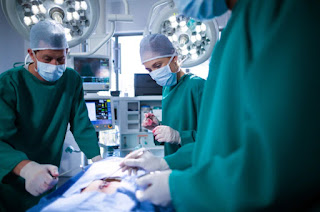What is an endoscopy?
An endoscopy is a medical treatment that involves inserting a tool (an endoscope, or ‘scope') into the body to observe interior structures and organs. This process is used to explore symptoms, diagnose diseases, and provide medicines. Endoscopy can be classified into several varieties based on the procedure's goal, the internal structures examined, and the equipment utilised.
What exactly happens during an
endoscopy?
Getting
ready for an endoscopy, there are
some steps you should take before your endoscopy to ensure that you are ready
for the procedure:
Consumption
of drinks and snacks
·
You should not eat anything for 6-8 hours before
any treatment that requires general anaesthesia. You can consume clear fluids
up to 2 hours before the procedure. This also applies whether you are
undergoing a GI operation (upper endoscopy) or a bronchoscopy.
·
If you are undergoing a colonoscopy, you must avoid specific meals in the days preceding
the operation (talk to your doctor about what you need to avoid). You will also
need to take a laxative the day before the colonoscopy
to aid with bowel preparation.
·
You can eat and drink normally before a cystoscopy or hysteroscopy if just a local anaesthetic is used.
Medications
·
It is critical to double-check all of your
prescriptions before undergoing an invasive treatment.
·
If you are using blood-thinning medications such
as warfarin or clopidogrel, you may need to discontinue them a few days before
the procedure.
·
Some drugs that affect bowel movements
(including some pain relievers) may also need to be discontinued if you are
undergoing a colonoscopy.
·
Your doctor will explain any medication
modifications that are required prior to your endoscopy. Visit Dr. Paithankar's
Clinic for
endoscopy
treatment in Gurgaon.
What
are the risks associated with endoscopy?
Overall, endoscopy is a highly safe operation with few
problems and negative results. There are, however, a few possible hazards to be
aware of:
Perforation
This is when the scope penetrates the wall of the organ
being examined. This is an extremely uncommon complication that occurs in just
1-2 occurrences per 1,000 colonoscopies, and it is treated quickly with
surgery.
Sedation reaction
Mild sedative effects (such as nausea) are typical; however,
more significant adverse reactions including allergic reactions or anaphylaxis,
while rare, are also possible consequences that must be watched during the
treatment.
Infection
Any invasive medical operation has the potential to
introduce infection, however all measures are taken to reduce this risk. If you
have any indications of infection after an endoscopy
(such as redness, discomfort, swelling, or a high fever), consult your doctor.
If an infection occurs, antibiotics can be used to treat it.
Bleeding
Any substantial bleeding that occurs during the surgery will
be treated properly. If there is any bleeding following the surgery, you should
visit your doctor as soon as possible.
Pancreatitis
A technique known as 'Endoscopic Retrograde
Cholangiopancreatography' (more usually
shortened to ERCP), which examines the pancreas and biliary system, has a
10% chance of causing pancreatitis (pancreatic
inflammation).
If you develop any of the following symptoms after an endoscopy, you should contact your
doctor or go to the local A&E as soon as possible:
- Stools in black or dark colours
- Breathing difficulty
- Chest pains
- Abdominal discomfort that is severe and chronic
- Blood in the vomit
·

Comments
Post a Comment